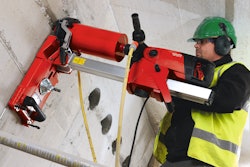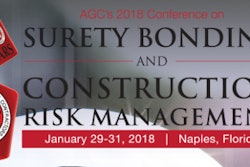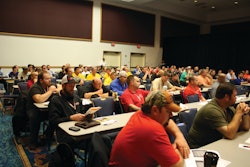Contractors attending CONEXPO-CON/AGG 2014 have the opportunity to not only see the latest in construction equipment and products, but they also have the ability to attend over 100 educational sessions and seminars. The educational sessions are grouped into 10 tracks including: aggregates, asphalt, concrete, cranes and rigging (new in 2014), earthmoving and site development, equipment asset management, management best practices, workforce development, recycling/sustainability (new in 2014), and safety. Sessions run from the morning through the afternoon starting Tuesday March 4 though Friday March 7.
The following are just some of the education sessions available to show attendees. For a complete list and in-depth explanation of all the education sessions go to http://www.conexpoconagg.com/Education.
Automated Grade Control GPS
Earthmoving & Site Development
T14 – Tuesday March 4, 8:30-9:30 a.m.
At this session a panel discussion will spotlight the Automated Grade Control toolbox interface. Attendees will learn how automated grade control GPS can improve productivity, understand the GPS toolbox interface and how it applies to grade control, and how to integrate GPS technology into grade control applications.
Telematics In Transition for Fleet Managers
Equipment Asset Management
T15 - Tuesday March 4, 8:30-9:30 a.m.
Attendees at this session will learn how many OEMs are working with AEMP to develop common data points that can be gathered from a mixed fleet using one program. In addition to learning how telematics can help managers gather and maintain common data, attendees will also learn how to implement a successful telematics program as well as how working with AEMP can help a company reap benefits using telematics technology.
Go Green with Cold Central Asphalt Recycling
Recycling/Sustainability
T22 – Tuesday March 4, 10:00-11:30 a.m.
Cold central plant recycling (CCPR) offers the opportunity to use RAP contents of 70 percent or greater to produce a low cost, high quality stabilized base or surface mixes. This session will teach how to develop CCPR materials from RAP, track the performance of CCPR mixes and learn from other contractors using this technology.
Federal Employment Law Boot Camp for Executives and Managers
Management Best Practices
T27 – Tuesday March 4, 1:00-2:30 p.m.
Learning objectives for this session include knowing and understanding primary federal employment law legislation and regulations; understanding supervisor responsibilities for executing these laws and regulations; and understanding how compliance boundaries can reduce the personal legal liability of a company’s executives and managers.
A Unique Perspective – Staff Retention in Construction Employment
Workforce Development
T40 - Tuesday March 4, 3:00-4:00 p.m.
This presentation will look at trends in construction before and during the recession as well as trends that will be coming in the future. Attendees will learn how to take advantage of these trends to maximize their companies’ value in the business world and in their markets. Individuals will also learn how they can provide the best service to their companies and maximize their value to their employer.
Best Practice for Compaction of Asphalt Pavements Part 1
Asphalt
T33 – Tuesday March 4, 3:00-4:00 p.m.
Learn best practices and basics for safe quality laydown and compaction procedures as well as the importance of communication between the paving foreman, QC manager and TECH, roller operators, paver operators and screed operators. Lessons from this session can be applied to help control insurance costs and improve the bottom line.
Concrete Pavement: How to Get the Biggest Bang for the Buck in Street/Local Road Applications
Concrete
T35 – Tuesday March 4, 3:00-4:00 p.m.
This session will help attendees learn what not to do when designing and specifying concrete pavement for streets and roads. Attendees will also explore design optimization, complementary design details, life cycle cost analysis, concrete overlays and sustainability.
What’s New in Tower Crane Standards
Crane & Rigging
T36 – Tuesday March 4, 3:00-4:00 p.m.
The changed ASME B30.3 Tower Cranes standard and the new ASME B30.29 Mobile Self Erecting Tower Cranes standard were released in 2012. This session explores the key points operators should know to understand the standards and ensure they are compliant with safety standards.
Health Care Reform and How Your Decision Will Affect Your Company
Management Best Practices
T34 – Tuesday March 4, 3:00-4:00 p.m.
Health care reform is a huge topic of discussion that is fast approaching. In this session, attendees will learn what health care reform means for their companies, whether it’s better to offer a benefits program or opt out and pay the penalty, and how to develop a benefits program that is in compliance with the 2014 law.
Reduce, Reuse, Recycle with High-Percentage RAP Asphalt Plants
Asphalt
W42 – Wednesday March 5, 8:30-9:30 a.m.
Learning objectives for this session include identifying methods and equipment that produce high quality paving materials using high percentages of RAP and how to maximize the use and address problems with recycled asphalt shingles.
Concrete and Asphalt Recycling for the Small to Medium Size Demolition and Site Work Contractor
Recycling/Sustainability
W45 – Wednesday March 5, 8:30-9:30 a.m.
A panel of contractors will reveal how they have successfully used jobsite impact crushing to gain a competitive edge and increase profitability. The session will help contractors select the right equipment for various job applications, learn how recycling can make a bid more competitive and how impact crushing produces usable and compactable material.
Preventing Runovers and Backovers in Roadway Work Zones
Safety
W48 – Wednesday March 5, 8:30-9:30 a.m.
Safety first. This session will explore the “Internal Traffic Control” concept used to train contractors and construction workers on how to safely navigate around a work zone to avoid runovers and backovers. Attendees will also learn how to create a basic Internal Traffic Control Plan.
Concrete Surface Defects: Causes, Preventing and Cure
Concrete
W52 – Wednesday March 5, 10:00-11:30 a.m.
Surface defects can be caused by inadequate design, construction and maintenance. This session will identify existing problems, suitable solutions and preventative measures.
You Are Who You Hire: Contractor Safety Management
Safety
W55 – Wednesday March 5, 10:00-11:30 a.m.
The contractors your company hires affect your safety culture, safety results and corporate reputation. Learn best practices for hiring and managing contractors that support your commitment to safety. The session will also identify the six criteria for safety excellence and four steps to accountability.
Evolution of Tier 4 Regulations and Project Specific Requirements
Equipment Asset Management
W67 - Wednesday March 5, 3:00-4:00 p.m.
Tier 4 has been on the construction industry’s radar for some time now. In this session, learn how diesel engine regulations have incorporated Tier 4 engine emissions technology, how to incorporate Tier 4 equipment into your fleet while remaining competitive and understanding the regulator time frames.
Filling the Skills Gap with Technology
Workforce Development
W70 – Wednesday March 5, 3:00-4:00 p.m.
Technology on the jobsite is increasing, especially with the availability of mobile devices. This session will explore how mobile connectivity increases employee skills, lowers response time and increases efficiency. Other focuses of the session include understanding the positive psychological impact technology has on front line workers and how mobility, particularly in asset maintenance, increases employee skills and productivity.
The Benefits and Bonuses of Paving
Asphalt
TH71 – Thursday March 6, 8:30-9:30 a.m.
Many paving projects provide bonuses for high quality materials and construction. How do contractors achieve consistent high quality to obtain these bonuses? This session will explore best practices for paving, techniques to ensure best practices are being used and how these best practices can earn bonuses in your paving projects.
Key Issues in Crane Safety
Crane & Rigging
TH74 – Thursday March 6, 8:30-9:30 a.m.
Attend this session to review and understand OSHA regulations for crane safety and operator qualifications, know the dangers of unsafe crane operation during assembly and disassembly, know the dangers of operating around power lines, and learn how to conduct qualified crane inspections. The session will also focus on the importance of crane operator training and certification.
Repair/Replace/Rebuild – Planning for Effective Decision Making in Relation to Equipment
Equipment Asset Management
TH82 – Thursday March 6, 10:00-11:30 a.m.
Data is essential for making key decisions about your equipment. This session explores components of the decision making process including: identifying data to collect, defining processes to make the data work, maintenance effectiveness, condition monitoring, repairs before failure, and the benefits of partnering with equipment dealers who can assist with the decision making process. Finally, the session will look at considerations and rules of thumb when making the repair/replace/rebuild decision.
Expanding Your Market with In-Place Recycling
Recycling/Sustainability
TH83 – Thursday March 6, 10:00-11:30 a.m.
Learn about the equipment, materials and methods for hot in-place and cold in-place recycling, cold central plant recycling (CCPR) and full depth reclamation. Attendees will also leave the session knowing how to integrate in-place recycling processes and develop and produce CCPR materials from 100 percent recycled asphalt pavement.
Understanding and Lowering Your Facility’s Energy Costs
Aggregates
TH86 – Thursday March 6, 1:00-2:30 p.m.
Companies can incorporate sustainable initiatives in many areas of their businesses, energy use being one of them. This session will help attendees understand energy costs and opportunities for reduction. After attending the session you should be able to understand how to read and understand utility charges as well as how energy is consumed and charged within your facility.
Tack & Bond Coats for Asphalt Paving
Aggregates
TH94 – Thursday March 6, 3:00-4:00 p.m.
Attend this session to learn how selecting and placing the right tack and bond coats can reduce tracking. Learning objectives include: examining the factors influencing successful tack and bond coats; how to properly place tack and bond coats; and new developments in reducing tracking.
Recent Advances in the Design and Construction of Roller-Compacted Concrete Pavements
Concrete
TH96 – Thursday March 6, 3:00-4:00 p.m.
While roller-compacted concrete (RCC) has been in use for over 30 years, recent years have seen an increase in its use for highways, streets and parking areas. With this emergence comes improved methods for mixing and placing RCC. Attendees were learn what RCC is including its applications, benefits and limitations. The session will also focus on how to design an RCC mixture, the construction process and case studies that help explain the process.
Strategic Maintenance Issues – An Executive Approach to Equipment Maintenance
Equipment Asset Management
TH98 – Thursday March 6, 3:00-4:00 p.m.
This session stresses the importance of a disciplined, systematic and thorough approach to maintenance. Preventive and condition-based maintenance are just two steps of many possible actions. Case studies will show how the impact of different maintenance strategies can be quantified and measured. Attendees should come away from this session realizing maintenance is an investment rather than a cost and how good routine maintenance can be critical to balance between the age, cost and reliability of your fleet.
Unstoppable Sales & Marketing – Practical Strategies and Tactics to Grow Your Business
Management Best Practices
TH95 – Thursday March 6, 3:00-4:00 p.m.
Sit in while a seasoned marketing consultant reveals secrets for building profits, market strength and sales growth by working with what you have. The speaker will focus on how contractors can leverage worthy markets, effective process and persuasive communications. He will also reveal secrets to segmenting, evaluating and targeting that can maximize return on effort and boost sales.
Federal Drivers’ Hours of Service Regulations in the Construction Industry
Safety
TH99 – Thursday March 6, 3:00-4:00 p.m.
Explore the background of hours of service (HOS) regulations, what the current regulations are and expectations for the construction industry. This session will also discuss why compliance is important and how drivers and companies can stay compliant.
Innovations in Steel Fiber Construction
Concrete
F103 – Friday March 7, 8:30-9:30 a.m.
Using steel fiber in concrete can help reduce the volume of rebar reinforcement needed. This session will dive into how this technology may revolutionize the future of concrete construction as well as how contractors can explore the advantages of fibrous concrete and use it to improve the quality of future projects.
Position Your Company for Success with GPS Technology for Earthmoving Equipment
Earthmoving & Site Development
F105 – Friday March 7, 8:30-9:30 a.m.
GPS positioning technologies offer a broad range of operational benefits. This session will look at how construction companies can implement an effective GPS positioning program and how to determine what return on investment GPS positioning can offer.
Seamlessly Connecting Design to the Field
Management Best Practices
F102 – Friday March 7, 8:30-9:30 a.m.
Leading this session is Dave Henderson, director of mobile mapping technologies for Topcon. Henderson will help attendees realize what steps are needed to link hardware and software to create a seamless workflow from field to office. In addition, a panel of industry experts will discuss how current and future integration of design and field execution will create a strong construction market. Finally, attendees will learn how using these hardware and software solutions through the cloud can reduce labor hours and even increase profits.
Effective vs. Efficient – Doing the Right Things!
Workforce Development
F108 – Friday March 7, 8:30-9:30 a.m.
Almost everyone is asked to multitask each day at their job. But how do you prioritize these tasks and make sure they are completed to the best quality? In this session, participants will determine the difference between trying to get everything done and planning to do the right things. After attending this session contractors should be able to: identify the six high payoff activities where at least 80 percent of their time should be spent; determine obstacles and solutions to spending the right amount of time on each high payoff activity; and implement tools to organize priorities and schedule and manage time efficiently.
Managing Electrical Diagnostics
Equipment Asset Management
F115 – Friday March 7, 10:00-11:30 a.m.
Learn how the process of diagnosing and repairing (D&R) electrical systems on modern transportation systems is different from the process of diagnosing mechanical systems. Other learning objectives include how to apply the various components of electrical D&R process to your management program and what human and environmental factors can have negative impacts on technicians maintaining electrical systems.
BIM 101 - Horizontal
Management Best Practices
F112 – Friday March 7, 10:00-11:30 a.m.
This session provides an overview of BIM terminology and practices. It will also introduce key benefits and how to approach building or expanding a BIM team in your company. The session will provide a seven-step process for a clear, concise plan for success. Finally, attendees will explore the financial investment required to build a BIM team and the return on investment for BIM.
Get Lean and Green with Lean Construction
Management Best Practices
F119 – Friday March 7, 1:00-2:30 p.m.
Lean construction is another industry buzzword. Its purpose is to find better ways to manage the overall construction process. Attendees of this session will explore Lean terminology and practices as well as key benefits of incorporating Lean construction processes into your business. The session will also look at how Lean Construction is changing the current construction process.
Responding to OSHA/MSHA Document Requests
Safety
F122 – Friday March 7, 1:00-2:30 p.m.
OSHA and MSHA have become more aggressive in demanding documents of all types during inspections and accident investigations. In addition, demands for third party documents, such as those from insurance companies, can create legal liability exposure. This session will discuss mandatory and non-mandatory safety-related documents, how to respond to inspector demands, how to privilege critical materials and other defensive strategies. It will also look at recent case law developments affecting document production.



















